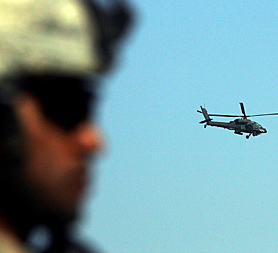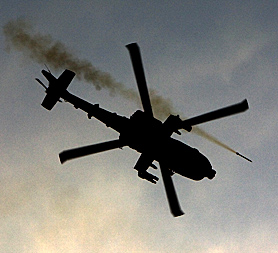Apaches mark ‘serious moment’ in conflict and cost of Libya
With Apache helicopters poised to attack Libya, MPs warn the Government it does not have a “blank cheque” to fund the fight against Colonel Gaddafi. Channel 4 News looks into upping the tempo.

The Government maintains that any deployment of Apaches would mark a tactical shift, rather than an escalation of conflict in Libya.
Yet the use of Apaches would see costs to the taxpayer balloon. In 2006, the British Army bought 67 Apache helicopters for £2.5bn – or around £37m each.
Defence Analyst Dr Kenneth Freeman estimates annual maintenance and operating costs of up to £10m a year per Apache.
Once deployed to war, costs soar. Mr Freeman said: “First of all, at war they are worked a lot harder. Secondly they attract metal; and they require repairs, fuel, and a base – so you’ve got the cost of a ship or on the ground support.”
Dr Freeman said Apaches are used “very carefully” by the government, on account of their cost.
Apache costs
The cost to the taxpayer of flying an Apache during peacetime is £42,000 an hour. That is £7,000 more than it costs to keep a Tornado in the air for an hour, at £35,000, while a Eurofighter Typhoon costs £70,000 an hour – taking into account the cost of fuel, staffing and maintenance.
Sending Apache helicopters into Libya would, as the Liberal Democrats pointed out yesterday, see a move from desert warfare to urban warfare.
Apaches are designed to hunt and destroy tanks, and to operate in all weathers, day or night.
Between November 2006 and March 2010, the number of UK battlefield helicopter flying hours jumped by 140 per cent, according to a parliamentary debate last March.
Apache deployment to Libya is a given
Wattisham Flying Station in the rolling fields and hedges of Suffolk - green beyond belief for army aircrews returning from Afghanistan here, as they did this weekend, writes Chief Correspondent Alex Thomson.
The army insists today's media visit to film Apache helicopters here has nothing to do with mounting speculation that these aircraft will soon be blowing things up in Libya.
Read more: Apache deployment to Libya is a given
Apaches in Afghanistan
The Army announced today that its Apache fleet has clocked up a landmark 100,000 flying hours – a third of which have been flown on operations in Afghanistan.
Two units of the Army Air Corp have provided a continuous presence in Afghanistan since 2006 on rotation, with some personnel completing five four-month long tours.
Armed Forces Minister Nick Harvey has stressed that any deployment to Libya would not impact Britain’s efforts in Afghanistan – which are setting us back £4bn a year.
If needed, the Apaches likely to be sent out to Libya would be those currently on exercise in the Mediterranean, he said. “That would therefore not have any impact on operations in Helmand”.

Military Ops Reserve fund
Nevertheless, Labour MP Jim Murphy said: “This is a serious moment and it would be a serious escalation”.
He warned that: “Parliament has not written the Government a blank cheque on Libya and ministers should never keep the British public in the dark about major deployments.”
Mr Harvey has sidestepped reports that six months of conflict could cost £1bn, by September.
He insisted it is too early to say, adding that in any case: “The Chancellor of the Exchequer has made it clear that the cost of this operation will be met by the reserve.”
Professor Malcolm Chalmers, director of research at Royal United Services Institute (RUSI), estimates that the cost of Britain’s intervention in Libya has already topped the £100m mark.
The government has £4bn set aside in Special Reserve fund for “genuinely unforeseen” military operations in the current financial year, the Treasury told Channel 4 News.
This is taken straight from the Treasury’s main reserves and not the Ministry of Defence’s budget, which is under pressure to cut costs. The Special Reserve will cover the cost of conflict in Libya above and beyond what is budgeted for by the MoD to have a force sitting ready and waiting for war.
If the Special Reserve runs dry, the difference would be met by the Government’s general Reserve pot, which has £3.3bn for the 2011-12 financial year.
Yet it is Parliament that must sign off any costs charged to the Reserve.
-
Latest news
-
Windrush scandal: returning to the UK after a forty year wait6m

-
Netanyahu ‘survival’ depends on ‘expanding war’ says head of Palestinian National Initiative5m

-
Proposed law change could strip parental rights from paedophiles5m

-
Hugh Grant settles privacy lawsuit against The Sun newspaper publisher2m

-
Post Office Scandal: what did top executive know?6m

-




